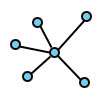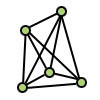
Netwar
Encyclopedia
Netwar is a term developed by RAND
researchers John Arquilla
and David Ronfeldt to describe an emergent form of low intensity conflict, crime, and activism waged by social network
ed actors. Typical netwar actors might include transnational terrorists, criminal organizations, activist groups, and social movement
s that employ decentralized
, flexible network structure
s.
conflict, such as ‘information warfare
’, are inadequate, focusing too narrowly on technological issues while missing the broader social transformation enabled by technological advances.
‘Cyberwar’ is a corresponding term which Arquilla and Ronfeldt propose to describe high-intensity information age conflicts.
Netwar actors may also take on hybrid forms as well, blending different types of networks and hierarchies. For instance, a node
in the network may be hierarchical, an organization may shift between hierarchy and networked autonomy depending on operational demands, or various members of the same group may be networked to each other through different types of network structures.
, “allowing for local initiative and autonomy” in an organization that may at times appear “acephalous (headless), and at other times polycephalous (hydra-headed).”
The all-channel network is one of the most difficult to maintain because it requires a strong communications capacity to maintain ties between nodes. Moreover, nodal autonomy results in a distributed, consensus style of decision making which is necessarily dependent on back-and-forth communication. As such, this form of organization has only recently become feasible on a greater scale with the dawn of the information age.
, will become the dominant form of organization following past eras of tribal
, institutional/hierarchical, and market based societies
.
Proponents of netwar argue that globalization
has set the stage for the rise of networks. Borders are now more permeable to flows of people, capital, and information; non-state actors have gained power vis-à-vis states; and the information revolution has empowered individuals and dispersed groups. States have begun experimenting with networking and cooperation to tackle transnational issues
, non-governmental organizations have formed transnational advocacy networks around shared goals, multinational corporation
s have distributed and networked their operations around the globe, and even criminal and terrorist organizations have shifted to more agile and resilient network forms.
Advances in communications technologies have played a large part in enabling globalization, and likewise play a crucial role in enabling netwar. Networks, especially global or transnational networks, require “rapid, dense, multidirectional communications to function well and endure”. This level of communication has only now been made easily attainable and affordable with the spread of the internet, satellite communications, cellular phones, digitization, wireless communications, fax, email, etc., all of which allow “diverse, dispersed, autonomous actors […] to consult, coordinate, and act jointly across great distances on the basis of more, better, and faster information than ever before”.
With this rubric, the strength of a netwar actor corresponds to how highly networked it is, whether its doctrine
sustains the network and guides its members, how effectively technology is used to maintain the network, and how much interpersonal trust there is between nodes in the network.
Networks with many leaders, or no leader, may maintain coordination through a combination of powerful doctrine, ideology, shared beliefs, and/or common interests. This allows all the members of the network to maintain a common objective despite great personal or group autonomy. In other words, this provides an “ideational, strategic, and operational centrality that allows for tactical decentralization.”
Terrorist groups, in the Middle East especially, seem to be adopting flexible, decentralized network structures as part of a shift away from “formally organized, state-sponsored groups to privately financed, loose networks of individuals and subgroups that may have strategic guidance but that, nonetheless, enjoy tactical independence”.
Past terrorist groups did incorporate autonomous cells, but they were largely coordinated in a non-networked manner. Newer terrorist movements, such as al-Qaeda employ less hierarchical, loosely interlinked organizational models. Rather than the rigid bureaucratic structures and nationalist agendas of old terror groups, these new operatives are networked, relying on decentralized decision making with flexible ties between other individuals and radical groups sharing common values.
The Zapatista
movement began as a seemingly traditional, hierarchical insurgency
, but was transformed into an information-age conflict. It has benefited from a diverse network of actors, made up of indigenous communities, non-indigenous middle-class guerilla leaders, and a range of local and transnational NGOs sympathetic to the Zapatista cause. Numerous transnational NGOs networked with local Mexican NGOs that were involved with the marginalized indigenous community and the Zapatista guerillas.
Following setbacks in battle, the guerillas switched tactics and began to exploit the network form, taking advantage of the NGOs connections to mobilize global awareness and support for their reform movement, while putting pressure on the Mexican government. These diverse groups of activists and issue organizations were united by common values and shared goals. The internet, which was in its infancy at the time, also became a key space for networking various groups from around the globe with the Zapatista movement.
Transnational Criminal organizations (TCOs) are empowered by the network form in the sense that it heightens their mobility, adaptability, and their ability to operate transnationally. These transnational networks pose a problem for states operating in a conventional, inwardly focused manner. For instance, cartels in Colombia draw power from their extended transnational network resources, making it difficult for the Colombian government to fight the cartels within the confines of its national boundaries. Thus, networking allows TCOs to easily operate across jurisdictions, evading national law enforcement agencies. Networks also make it more difficult to dismantle a criminal operation, given that there is less emphasis on rigid, central leadership.
RAND
RAND Corporation is a nonprofit global policy think tank first formed to offer research and analysis to the United States armed forces by Douglas Aircraft Company. It is currently financed by the U.S. government and private endowment, corporations including the healthcare industry, universities...
researchers John Arquilla
John Arquilla
John Arquilla received a PhD in International Relations from Stanford in 1991. He worked at RAND for several years, before joining the faculty of the US Naval Postgraduate School in 1993....
and David Ronfeldt to describe an emergent form of low intensity conflict, crime, and activism waged by social network
Social network
A social network is a social structure made up of individuals called "nodes", which are tied by one or more specific types of interdependency, such as friendship, kinship, common interest, financial exchange, dislike, sexual relationships, or relationships of beliefs, knowledge or prestige.Social...
ed actors. Typical netwar actors might include transnational terrorists, criminal organizations, activist groups, and social movement
Social movement
Social movements are a type of group action. They are large informal groupings of individuals or organizations focused on specific political or social issues, in other words, on carrying out, resisting or undoing a social change....
s that employ decentralized
Decentralization
__FORCETOC__Decentralization or decentralisation is the process of dispersing decision-making governance closer to the people and/or citizens. It includes the dispersal of administration or governance in sectors or areas like engineering, management science, political science, political economy,...
, flexible network structure
Social network
A social network is a social structure made up of individuals called "nodes", which are tied by one or more specific types of interdependency, such as friendship, kinship, common interest, financial exchange, dislike, sexual relationships, or relationships of beliefs, knowledge or prestige.Social...
s.
Terminology
The term is proposed in order to focus specifically on the spread of network based organizational structures throughout the low intensity spectrum of societal conflict. It is argued that other terms applied to information ageInformation Age
The Information Age, also commonly known as the Computer Age or Digital Age, is an idea that the current age will be characterized by the ability of individuals to transfer information freely, and to have instant access to knowledge that would have been difficult or impossible to find previously...
conflict, such as ‘information warfare
Information warfare
The term Information Warfare is primarily an American concept involving the use and management of information technology in pursuit of a competitive advantage over an opponent...
’, are inadequate, focusing too narrowly on technological issues while missing the broader social transformation enabled by technological advances.
‘Cyberwar’ is a corresponding term which Arquilla and Ronfeldt propose to describe high-intensity information age conflicts.
Network structures
Arquilla and Ronfeldt point to three basic types of networks that may be used by netwar actors:  |
Chain network – typified by smuggling Smuggling Smuggling is the clandestine transportation of goods or persons, such as out of a building, into a prison, or across an international border, in violation of applicable laws or other regulations.There are various motivations to smuggle... networks, where end-to-end exchanges (information, contraband, etc.) must travel back and forth between intermediary nodes. |
 |
Hub or star network – disparate actors are tied to a central (though not necessarily hierarchical) node, and all communication travels through that central node. |
 |
All-channel network – every individual actor is able to communicate fully with all other nodes in the network. |
Netwar actors may also take on hybrid forms as well, blending different types of networks and hierarchies. For instance, a node
Vertex (graph theory)
In graph theory, a vertex or node is the fundamental unit out of which graphs are formed: an undirected graph consists of a set of vertices and a set of edges , while a directed graph consists of a set of vertices and a set of arcs...
in the network may be hierarchical, an organization may shift between hierarchy and networked autonomy depending on operational demands, or various members of the same group may be networked to each other through different types of network structures.
All-channel networks
Arquilla and Ronfeldt argue that it is the all-channel model that is becoming increasingly significant as a source of organizational collaborative power. The all-channel network has no central leadership and no key node whose removal might disrupt the entire organization. Instead, the network is completely decentralizedDecentralization
__FORCETOC__Decentralization or decentralisation is the process of dispersing decision-making governance closer to the people and/or citizens. It includes the dispersal of administration or governance in sectors or areas like engineering, management science, political science, political economy,...
, “allowing for local initiative and autonomy” in an organization that may at times appear “acephalous (headless), and at other times polycephalous (hydra-headed).”
The all-channel network is one of the most difficult to maintain because it requires a strong communications capacity to maintain ties between nodes. Moreover, nodal autonomy results in a distributed, consensus style of decision making which is necessarily dependent on back-and-forth communication. As such, this form of organization has only recently become feasible on a greater scale with the dawn of the information age.
Historical context
The theory of netwar rests on the prediction that networks, enabled by information technologyInformation technology
Information technology is the acquisition, processing, storage and dissemination of vocal, pictorial, textual and numerical information by a microelectronics-based combination of computing and telecommunications...
, will become the dominant form of organization following past eras of tribal
Tribalism
The social structure of a tribe can vary greatly from case to case, but, due to the small size of tribes, it is always a relatively simple role structure, with few significant social distinctions between individuals....
, institutional/hierarchical, and market based societies
Market system
A market system is any systematic process enabling many market players to bid and ask: helping bidders and sellers interact and make deals. It is not just the price mechanism but the entire system of regulation, qualification, credentials, reputations and clearing that surrounds that mechanism and...
.
Proponents of netwar argue that globalization
Globalization
Globalization refers to the increasingly global relationships of culture, people and economic activity. Most often, it refers to economics: the global distribution of the production of goods and services, through reduction of barriers to international trade such as tariffs, export fees, and import...
has set the stage for the rise of networks. Borders are now more permeable to flows of people, capital, and information; non-state actors have gained power vis-à-vis states; and the information revolution has empowered individuals and dispersed groups. States have begun experimenting with networking and cooperation to tackle transnational issues
Transnationalism
Transnationalism is a social movement and scholarly research agenda grown out of the heightened interconnectivity between people and the receding economic and social significance of boundaries among nation states....
, non-governmental organizations have formed transnational advocacy networks around shared goals, multinational corporation
Multinational corporation
A multi national corporation or enterprise , is a corporation or an enterprise that manages production or delivers services in more than one country. It can also be referred to as an international corporation...
s have distributed and networked their operations around the globe, and even criminal and terrorist organizations have shifted to more agile and resilient network forms.
Advances in communications technologies have played a large part in enabling globalization, and likewise play a crucial role in enabling netwar. Networks, especially global or transnational networks, require “rapid, dense, multidirectional communications to function well and endure”. This level of communication has only now been made easily attainable and affordable with the spread of the internet, satellite communications, cellular phones, digitization, wireless communications, fax, email, etc., all of which allow “diverse, dispersed, autonomous actors […] to consult, coordinate, and act jointly across great distances on the basis of more, better, and faster information than ever before”.
Netwar and network dynamics
The high flexibility and reconfigurability inherent in the network structure creates a challenge in maintaining its effectiveness. Arquilla and Ronfeldt identify four areas that affect the strength of a network:- Organization – what type of network is employed, and to what extent are the actors networked?
- Doctrine – what motivates the use of the network form, what keeps it from falling apart, and how does the organization operate without central leadership?
- Technology – what communication technology is being used, and how?
- Social ties – how much interpersonal trust exists within the network?
With this rubric, the strength of a netwar actor corresponds to how highly networked it is, whether its doctrine
Doctrine
Doctrine is a codification of beliefs or a body of teachings or instructions, taught principles or positions, as the body of teachings in a branch of knowledge or belief system...
sustains the network and guides its members, how effectively technology is used to maintain the network, and how much interpersonal trust there is between nodes in the network.
Networks with many leaders, or no leader, may maintain coordination through a combination of powerful doctrine, ideology, shared beliefs, and/or common interests. This allows all the members of the network to maintain a common objective despite great personal or group autonomy. In other words, this provides an “ideational, strategic, and operational centrality that allows for tactical decentralization.”
Examples
The following are several examples used to support the argument that there is in fact an emergent netwar.- Terrorism
Terrorist groups, in the Middle East especially, seem to be adopting flexible, decentralized network structures as part of a shift away from “formally organized, state-sponsored groups to privately financed, loose networks of individuals and subgroups that may have strategic guidance but that, nonetheless, enjoy tactical independence”.
Past terrorist groups did incorporate autonomous cells, but they were largely coordinated in a non-networked manner. Newer terrorist movements, such as al-Qaeda employ less hierarchical, loosely interlinked organizational models. Rather than the rigid bureaucratic structures and nationalist agendas of old terror groups, these new operatives are networked, relying on decentralized decision making with flexible ties between other individuals and radical groups sharing common values.
- Zapatistas
The Zapatista
Zapatista Army of National Liberation
The Zapatista Army of National Liberation is a revolutionary leftist group based in Chiapas, the southernmost state of Mexico....
movement began as a seemingly traditional, hierarchical insurgency
Insurgency
An insurgency is an armed rebellion against a constituted authority when those taking part in the rebellion are not recognized as belligerents...
, but was transformed into an information-age conflict. It has benefited from a diverse network of actors, made up of indigenous communities, non-indigenous middle-class guerilla leaders, and a range of local and transnational NGOs sympathetic to the Zapatista cause. Numerous transnational NGOs networked with local Mexican NGOs that were involved with the marginalized indigenous community and the Zapatista guerillas.
Following setbacks in battle, the guerillas switched tactics and began to exploit the network form, taking advantage of the NGOs connections to mobilize global awareness and support for their reform movement, while putting pressure on the Mexican government. These diverse groups of activists and issue organizations were united by common values and shared goals. The internet, which was in its infancy at the time, also became a key space for networking various groups from around the globe with the Zapatista movement.
- Transnational Criminal Organizations
Transnational Criminal organizations (TCOs) are empowered by the network form in the sense that it heightens their mobility, adaptability, and their ability to operate transnationally. These transnational networks pose a problem for states operating in a conventional, inwardly focused manner. For instance, cartels in Colombia draw power from their extended transnational network resources, making it difficult for the Colombian government to fight the cartels within the confines of its national boundaries. Thus, networking allows TCOs to easily operate across jurisdictions, evading national law enforcement agencies. Networks also make it more difficult to dismantle a criminal operation, given that there is less emphasis on rigid, central leadership.
External links
- John Robb - Global Guerrillas
- Storytelling Netwar - USC Annenberg School for CommunicationUSC Annenberg School for CommunicationThe USC Annenberg School for Communication & Journalism comprises a School ofCommunication and a School of Journalism at the University of Southern California . It is led by Dean Ernest J. Wilson III, Ph.D....
- Paul de Armond, Netwar in the Emerald City - RANDRANDRAND Corporation is a nonprofit global policy think tank first formed to offer research and analysis to the United States armed forces by Douglas Aircraft Company. It is currently financed by the U.S. government and private endowment, corporations including the healthcare industry, universities...
- Netwar at New College - Public Good Project

